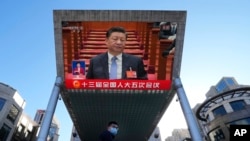China’s Ministry of State Security issued a fresh warning this week about overseas spy agencies and what it says are their efforts in recent years to obtain state secrets under the disguise of consulting agencies.
The six-minute video released Thursday on the ministry’s official WeChat social media account reenacts what it says was a real case where overseas spy agencies instructed a consulting firm to steal classified information from a Chinese company seeking to invest abroad.
The release of the video comes as Chinese leader Xi Jinping met this week with American CEOs in a bid reassure them that China remains open for business, despite concerns about its economy and worrying signals from the authoritarian government.
Over the past year, foreign investment in China has shrunk as supply chains shift to other countries while Chinese authorities have rolled out a new anti-espionage law and used exit bans to keep business executives and others from leaving the country. It has also carried out raids on consulting and due diligence firms.
During the same period, the Ministry of State Security has ramped up its use of social media to raise the alarm about foreign spies.
Its latest video — the fourth since it launched its social media account last year — has the feel of a spy thriller with dramatic music and fast-paced video elements and graphics.
It tells the story of an executive at a Chinese company who is pressed by a consulting firm representative on a string of questions, including the company’s total profit, the technical parameters of its products, and how its products are used by the Air Force.
In a WeChat post released with the video, the ministry warned about the national security risks that consultancy agencies pose.
"The seemingly normal investigation conducted by consulting firms are in fact attempts to illegally acquire our commercial secrets and efforts to suppress our advantageous industries," the ministry wrote, adding that these consulting firms are accomplices to foreign spy agencies aiming to infiltrate key sectors in China.
Intimidation campaign against Chinese citizens
Some experts say the video is tailored to the Chinese audience rather than foreign investors since the video is purely in Mandarin and features the arrest of a Chinese national working for a foreign consulting firm.
The purpose of the video is "to inform and intimidate Chinese citizens by telling them that the government is watching them," said Dennis Wilder, a former U.S. national security official. He added that the campaign will likely create a chilling effect among Chinese citizens, especially those working for foreign companies.
Over the last year, Chinese authorities have raided several American companies’ offices in China and detained some of their Chinese employees. Companies affected include due diligence firm Mintz Group, business consulting firm Capvision, and management consultancy Bain & Company.
Chilling effect for new foreign businesses
While the campaign focuses on Chinese citizens, Wilder said Beijing’s efforts to safeguard national security will also create a chilling effect for foreign businesses trying to enter the Chinese market.
Unlike big foreign companies with an established presence in China, such as Apple or Qualcomm, he said companies that have no presence in China need to conduct due diligence. "They have to understand what their counterparts in China are all about, but if they can’t conduct due diligence, they won’t invest in China," he told VOA in a video interview.
A survey conducted by foreign business groups in 2023 suggests foreign companies are increasingly pulling investments and operations out of China. Survey data show that only 45% of American companies view China as their primary or among their top three investment destinations while 66% of the companies surveyed by the European Union Chamber of Commerce in China said they found operating in China has become increasingly difficult.
Despite foreign companies’ lack of confidence in the Chinese market, some analysts say the Chinese government thinks efforts to safeguard national security and enhance foreign investors’ confidence in the Chinese market are not mutually contradictory.
"Beijing believes that while they try to attract more foreign businesses to invest in China, they also should ensure key national interests, such as core data or key infrastructure won’t be easily obtained by foreign businesses," said Hung Chin-fu, a political scientist at National Cheng Kung University in Taiwan.
He said Beijing’s approach will be met with deep suspicion among foreign businesses. "At a time when the Chinese government has laid out many red lines in the name of national security, investing in China will be like walking on thin ice for foreign companies," he told VOA by phone.
As foreign businesses will likely remain hesitant to increase their investment volumes in China, Wilder thinks Chinese leaders may have different views on whether to prioritize efforts to attract more foreign investment or the need to safeguard national security.
"For Xi Jinping, I think if he has to choose between foreign investment and economic growth and what he perceives as national security, he will always come out on the national security side," he told VOA.
But for other Communist Party leaders who must consider economic growth, such as Chinese Premier Li Qiang, Wilder thinks their consideration will be different from Xi’s.




